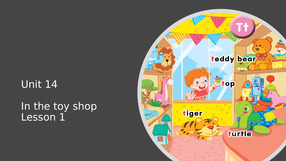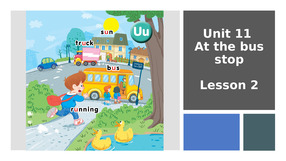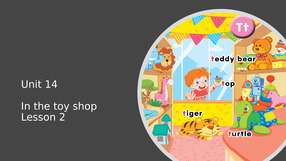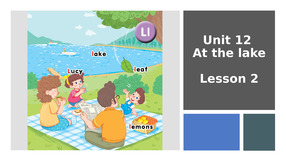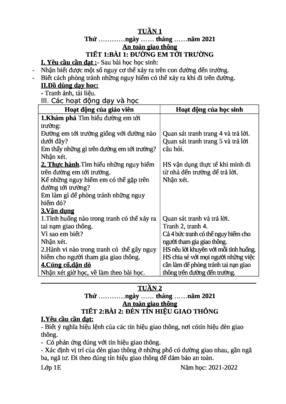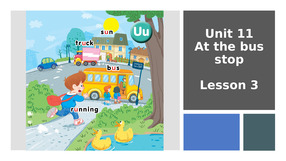Truyen co tich tieng anh
THE LITTLE GOLD FISH
Once upon a time...a poor fisherman lived in a humble cottage near the
sea.
One day, he set off as usual with his load of nets to go fishing.
Down on the shore, he had just thrown the nets into the sea, when
something glittering in the meshes caught his eye.
"What a strange fish!" he said to himself, picking up a golden yellow
fish.
And his amazement grew when he heard the fish say these words:
"Kind fisherman, let me go free! I'm the son of the Sea King, and if you
let me go, I'll grant any wish you care to make!" Alarmed at this miracle,
without a second thought, the fisherman tossed the fish back into the
water.
But when he went home and told his wife what had happened she scolded
him
soundly:
"What! When the fish said your wishes could come true, you should
have
asked it for something! Go back to the beach and if you see it, ask for a
new
washtub! Just look at the state of ours!"
The poorman went back to the shore. As soon as he called the fish, it
popped up from the water.
"Where you calling me? Here I am!" it said. The fisherman explained
what
his wife wanted, and the fish quickly replied:
"You were very good to me! Go home, and you'll see that your wish has
come
true!" Certain that his wife would be pleased, the fisherman hurried
home. But
the minute he opened the door, his wife screeched:
"So it really is a magic fish that you allowed to go free! Just look at
that old washtub! It's brand new! But if that little fish has such powers,
you
can't possibly be content with such a miserable little wish! Go straight
back
and get it to give you a new house!"
The fisherman hurried back to the shore.
"I wonder if I'll see it again! I hope it hasn't gone away! Little fish!
Little fish!" he began to call from the water's edge.
"Here I am! What do you want this time?" he heard it ask.
"Well, my wife would like . . ."
"I can imagine!" remarked the fish. "And what does she want now?"
"A big house!" murmured the fisherman, hesitantly.
"All right! You were kind to me and you shall have your wish!" The
fisherman lingered on the way home, enjoying the feeling of making his
wife
happy with a new house. The roof of the splendid new house was already
in
sight, when his wife rushed up to him in a fury.
"Look herel Now that we know how really powerfull this fish is, we
can't be
content with only a house! We must ask for more! Run back and ask for a
real
palace, not an ordinary house like this one! And fine clothes! And jewels
too!" The fisherman was quite upset. However, he had been henpecked
for so
many years that he was unable to say "no", so he trudged back to the
water's
edge. Full of doubts, he called the little fish, but it was some time before
it leapt from waves. In the meantime, the sea had begun to foam . . .
"I'm sorry to trouble you again, but my wife has had second thoughts,
and
she'd like a fine palace, and . . . and also. . ." Again the little fish
granted fisherman his wishes, but he seemed less friendly than before. At
last, relieved at having been able to see his wife's desires fulfilled, the
good fisherman turned homewards. Home was now a magnificent palace.
How
wonderful it was! At the top of a flight of steps leading to the palace,
stood
his wife, dressed like a great lady and dripping with jewels, impatiently
waiting for him.
-_
"Go back and ask for . . ." But the fisherman broke in:
"What? Such a fine palace! We must be content with what we have!
Don't you
think that's asking too much? . . ."
"Go back, I said! Do as you're told! And ask the fish to make me an
Empress!" The poor fisherman set off unhappily for the seashore. In the
meantime, a storm had blown up. The sky was black and terrible flashes
of
lightning lit the darkness, while the waves crashed angrily on the beach.
Kneeling on the rock amidst the spray, in a low voice the fisherman began
to
call the little fish. And when it came, he told it his wife's latest request.
But this time, after listening in silence, the little gold fish disappeared
beneath the waves without saying a word. And though the fisherman
waited, the
little fish never came back. A great flash of lightning, much brighter than
all the others lit up the sky, and the fisherman saw that both the new
house
and the palace had vanished without trace. The humble old cottage stood
where
it had always been. But this time, his wife was waiting for him in tears.
"It serves you right! We should have been pleased with what we had,
instead
of always asking for more!" grumbled the fisherman angrily. But in the
depths
of his heart, he was glad that everything had gone back to normal.
Next day and every day, he went back to his fishing, but he never saw
the
little goldfish again.
http://www.kidcrosswords.com/kidreader/fisherman_and_his_wife/fisher
man_and_his_wife_page5.htm
The Fisherman and His Wife
There was once upon a time a fisherman who lived with his wife in a pig-stye
close by the sea, and every day he went out fishing. And he fished, and he
fished. And once he was sitting with his rod, looking at the clear water, and he
sat and he sat. Then his line suddenly went down, far down below, and when
he drew it up again, he brought out a large flounder. Then the flounder said to
him, hark, you fisherman, I pray you, let me live, I am no flounder really, but
an enchanted prince. What good will it do you to kill me. I should not be good
to eat, put me in the water again, and let me go. Come, said the fisherman,
there is no need for so many words about it - a fish that can talk I should
certainly let go, anyhow. And with that he put him back again into the clear
water, and the flounder went to the bottom, leaving a long streak of blood
behind him.
Then the fisherman got up and went home to his wife in the pig-stye.
Husband, said the woman, have you caught nothing to-day. No, said the man,
I did catch a flounder, who said he was an enchanted prince, so I let him go
again. Did you not wish for anything first, said the woman. No, said the man,
what should I wish for. Ah, said the woman, it is surely hard to have to live
always in this pig-stye which stinks and is so disgusting. You might have
wished for a little hut for us. Go back and call him. Tell him we want to have a
little hut, he will certainly give us that. Ah, said the man, why should I go there
again. Why, said the woman, you did catch him, and you let him go again. He
is sure to do it. Go at once.
The man still did not quite like to go, but did not like to oppose his wife either,
and went to the sea. When he got there the sea was all green and yellow, and
no longer so smooth, so he stood still and said, flounder, flounder in the sea,
come, I pray thee, here to me. For my wife, good Ilsabil, wills not as I'd have
her will. Then the flounder came swimming to him and said, well what does
she want, then. Ah, said the man, I did catch you, and my wife says I really
ought to have wished for something. She does not like to live in a pig-stye any
longer. She would like to have a hut. Go, then, said the flounder, she has it
already.
When the man went home, his wife was no longer in the stye, but instead of it
there stood a hut, and she was sitting on a bench before the door. Then she
took him by the hand and said to him, just come inside. Look, now isn't this a
great deal better. So they went in, and there was a small porch, and a pretty
little parlor and bedroom, and a kitchen and pantry, with the best of furniture,
and fitted up with the most beautiful things made of tin and brass, whatsoever
was wanted. And behind the hut there was a small yard, with hens and ducks,
and a little garden with flowers and fruit. Look, said the wife, is not that nice.
Yes, said the husband, and so it shall remain - now we will live quite
contented. We will think about that said the wife. With that they ate something
and went to bed.
Everything went well for a week or a fortnight, and then the woman said, hark
you, husband, this hut is far too small for us, and the garden and yard are
little. The flounder might just as well have given us a larger house. I should
like to live in a great stone castle. Go to the flounder, and tell him to give us a
castle. Ah, wife, said the man, the hut is quite good enough. Why whould we
live in a castle. What. Said the woman. Just go there, the flounder can always
do that. No, wife, said the man, the flounder has just given us the hut, I do not
like to go back so soon, it might make him angry. Go, said the woman, he can
do it quite easily, and will be glad to do it. Just you go to him. The man's heart
grew heavy, and he would not go. He said to himself, it is not right, and yet he
went. And when he came to the sea the water was quite purple and dark-blue,
and grey and thick, and no longer so green and yellow, but it was still quiet.
And he stood there and said, flounder, flounder in the sea, come, I pray thee,
here to me. For my wife, good Ilsabil, wills not as I'd have her will. Well, what
does she want, now, said the flounder. Alas, said the man, half scared, she
wants to live in a great stone castle. Go to it, then, she is standing before the
door, said the flounder.
Then the man went away, intending to go home, but when he got there, he
found a great stone palace, and his wife was just standing on the steps going
in, and she took him by the hand and said, come in. So he went in with her,
and in the castle was a great hall paved with marble, and many servants, who
flung wide the doors. And the walls were all bright with beautiful hangings, and
in the rooms were chairs and tables of pure gold, and crystal chandeliers
hung from the ceiling, and all the rooms and bedrooms had carpets, and food
and wine of the very best were standing on all the tables, so that they nearly
broke down beneath it. Behind the house, too, there was a great court-yard,
with stables for horses and cows, and the very best of carriages. There was a
magnificent large garden, too, with the most beautiful flowers and fruit-trees,
and a park quite half a mile long, in which were stags, deer, and hares, and
everything that could be desired. Come, said the woman, isn't that beautiful.
Yes, indeed, said the man, now let it be, and we will live in this beautiful castle
and be content. We will consider about that, said the woman, and sleep upon
it. Thereupon they went to bed.
Next morning the wife awoke first, and it was just daybreak, and from her bed
she saw the beautiful country lying before her. Her husband was still
stretching himself, so she poked him in the side with her elbow, and said, get
up, husband, and just peep out of the window. Look you, couldn't we be the
king over all that land. Go to the flounder, we will be the king. Ah, wife, said
the man, why should we be king. I do not want to be king. Well, said the wife,
if you won't be king, I will. Go to the flounder, for I will be king. Ah, wife, said
the man, why do you want to be king. I do not like to say that to him. Why not,
said the woman. Go to him this instant. I must be king.
So the man went, and was quite unhappy because his wife wished to be king.
It is not right, it is not right, thought he. He did not wish to go, but yet he went.
And when he came to the sea, it was quite dark-grey, and the water heaved
up from below, and smelt putrid. Then he went and stood by it, and said,
flounder, flounder in the sea, come, I pray thee, here to me. For my wife, good
Ilsabil, wills not as I'd have her will. Well, what does she want, now. Said the
flounder. Alas, said the man, she wants to be king. Go to her. She is king
already. So the man went, and when he came to the palace, the castle had
become much larger, and had a great tower and magnificent ornaments, and
the sentinel was standing before the door, and there were numbers of soldiers
with kettle-drums and trumpets. And when he went inside the house,
everything was of real marble and gold, with velvet covers and great golden
tassels.
Then the doors of the hall were opened, and there was the court in all its
splendor, and his wife was sitting on a high throne of gold and diamonds, with
a great crown of gold on her head, and a sceptre of pure gold and jewels in
her hand, and on both sides of her stood her maids-in-waiting in a row, each
of them always one head shorter than the last. Then he went and stood
before her, and said, ah, wife, and now you are king. Yes, said the woman,
now I am king. So he stood and looked at her, and when he had looked at her
thus for some time, he said, and now that you are king, let all else be, now we
will wish for nothing more. No, husband, said the woman, quite anxiously, I
find time passes very heavily, I can bear it no longer. Go to the flounder - I am
king, but I must be emperor, too. Oh, wife, why do you wish to be emperor.
Husband, said she, go to the flounder. I will be emperor. Alas, wife, said the
man, he cannot make you emperor. I may not say that to the fish. There is
only one emperor in the land. An emperor the flounder cannot make you. I
assure you he cannot. What. Said the woman, I am the king, and you are
nothing but my husband. Will you go this moment. Go at once. If he can make
a king he can make an emperor. I will be emperor. Go instantly. So he was
forced to go.
As the man went, however, he was troubled in mind, and thought to himself, it
will not end well. It will not end well. Emperor is too shameless. The flounder
will at last be tired out. With that he reached the sea, and the sea was quite
black and thick, and began to boil up from below, so that it threw up bubbles,
and such a sharp wind blew over it that it curdled, and the man was afraid.
Then he went and stood by it, and said, flounder, flounder in the sea, come, I
pray thee, here to me. For my wife, good Ilsabil, wills not as I'd have her will.
Well, what does she want, now, said the flounder. Alas, flounder, said he, my
wife wants to be emperor. Go to her, said the flounder. She is emperor
already. So the man went, and when he got there the whole palace was made
of polished marble with alabaster figures and golden ornaments, and soldiers
were marching before the door blowing trumpets, and beating cymbals and
drums. And in the house, barons, and counts, and dukes were going about as
servants. Then they opened the doors to him, which were of pure gold. And
when he entered, there sat his wife on a throne, which was made of one piece
of gold, and was quite two miles high. And she wore a great golden crown that
was three yards high, and set with diamonds and carbuncles, and in one hand
she had the sceptre, and in the other the imperial orb. And on both sides of
her stood the yeomen of the guard in two rows, each being smaller than the
one before him, from the biggest giant, who was two miles high, to the very
smallest dwarf, just as big as my little finger. And before it stood a number of
princes and dukes. Then the man went and stood among them, and said,
wife, are you emperor now. Yes, said she, now I am emperor. Then he stood
and looked at her well, and when he had looked at her thus for some time, he
said, ah, wife, be content, now that you are emperor. Husband, said she, why
are you standing there. Now, I am emperor, but I will be Pope too. Go to the
flounder. Oh, wife, said the man, what will you not wish for. You cannot be
Pope. There is but one in christendom. He cannot make you Pope. Husband,
said she, I will be Pope. Go immediately, I must be Pope this very day. No,
wife, said the man, I do not like to say that to him. That would not do, it is too
much. The flounder can't make you Pope. Husband, said she, what nonsense.
If he can make an emperor he can make a Pope. Go to him directly. I am
emperor, and you are nothing but my husband. Will you go at once.
Then he was afraid and went, but he was quite faint, and shivered and shook,
and his knees and legs trembled. And a high wind blew over the land, and the
clouds flew, and towards evening all grew dark, and the leaves fell from the
trees, and the water rose and roared as if it were boiling, and splashed upon
the shore. And in the distance he saw ships which were firing guns in their
sore need, pitching and tossing on the waves. And yet in the midst of the sky
there was still a small patch of blue, though on every side it was as red as in a
heavy storm. So, full of despair, he went and stood in much fear and said,
flounder, flounder in the sea, come, I pray thee, here to me. For my wife, good
Ilsabil, wills not as I'd have her will. Well, what does she want, now, said the
flounder. Alas, said the man, she wants to be Pope. Go to her then, said the
flounder, she is Pope already. So he went, and when he got there, he saw
what seemed to be a large church surrounded by palaces. He pushed his way
through the crowd. Inside, however, everything was lighted up with thousands
and thousands of candles, and his wife was clad in gold, and she was sitting
on a much higher throne, and had three great golden crowns on, and round
about her there was much ecclesiastical splendor. And on both sides of her
was a row of candles the largest of which was as tall as the very tallest tower,
down to the very smallest kitchen candle, and all the emperors and kings
were on their knees before her, kissing her shoe. Wife, said the man, and
looked attentively at her, are you now Pope. Yes, said she, I am Pope. So he
stood and looked at her, and it was just as if he was looking at the bright sun.
When he had stood looking at her thus for a short time, he said, ah, wife, if
you are Pope, do let well alone. But she looked as stiff as a post, and did not
move or show any signs of life. Then said he, wife, now that you are Pope, be
satisfied, you cannot become anything greater now. I will consider about that,
said the woman.
Thereupon they both went to bed, but she was not satisfied, and greediness
let her have no sleep, for she was continually thinking what there was left for
her to be. The man slept well and soundly, for he had run about a great deal
during the day. But the woman could not fall asleep at all, and flung herself
from one side to the other the whole night through, thinking always what more
was left for her to be, but unable to call to mind anything else. At length the
sun began to rise, and when the woman saw the red of dawn, she sat up in
bed and looked at it. And when, through the window, she saw the sun thus
rising, she said, cannot I, too, order the sun and moon to rise. Husband, she
said, poking him in the ribs with her elbows, wake up. Go to the flounder, for I
wish to be even as God is. The man was still half asleep, but he was so
horrified that he fell out of bed. He thought he must have heard amiss, and
rubbed his eyes, and said, wife, what are you saying. Husband, said she, if I
can't order the sun and moon to rise, and have to look on and see the sun and
moon rising, I can't bear it. I shall not know what it is to have another happy
hour, unless I can make them rise myself. Then she looked at him so terribly
that a shudder ran over him, and said, go at once. I wish to be like unto God.
Alas, wife, said the man, falling on his knees before her, the flounder cannot
do that. He can make an emperor and a Pope. I beseech you, go on as you
are, and be Pope. Then she fell into a rage, and her hair flew wildly about her
head, she tore open her bodice, kicked him with her foot, and screamed, I
can't stand it, I can't stand it any longer. Will you go this instant.
Then he put on his trousers and ran away like a madman. But outside a great
storm was raging, and blowing so hard that he could scarcely keep his feet.
Houses and trees toppled over, the mountains trembled, rocks rolled into the
sea, the sky was pitch black, and it thundered and lightened, and the sea
came in with black waves as high as church-towers and mountains, and all
with crests of white foam at the top. Then he cried, but could not hear his own
words, flounder, flounder in the sea, come, I pray thee, here to me. For my
wife, good Ilsabil, wills not as I'd have her will. Well, what does she want, now,
said the flounder. Alas, said he, she wants to be like unto God. Go to her, and
you will find her back again in the pig-stye. And there they are still living to this
day.
THE SIX SWANS
Once upon a time, a certain king was hunting in a great forest,
and he chased a wild beast so eagerly that none of his attendants could
follow him. When evening drew near he stopped and looked around him,
and then he saw that he had lost his way. He sought a way out, but could
find none. Then he perceived an aged woman with a head which nodded
perpetually, who came towards him, but she was a witch. Good woman,
said he to her, can you not show me the way through the forest. Oh, yes,
lord king, she answered, that I certainly can, but on one condition, and if
you do not fulfil that, you will never get out of the forest, and will die of
hunger in it.
What kind of condition is it, asked the king. I have a daughter, said the
old woman, who is as beautiful as anyone in the world, and well deserves
to be your consort, and if you will make her your queen, I will show you
the way out of the forest. In the anguish of his heart the king consented,
and the old woman led him to her little hut, where her daughter was
sitting by the fire. She received the king as if she had been
expecting him, and he saw that she was very beautiful, but still
she did not please him, and he could not look at her without
secret horror. After he had taken the maiden up on his horse,
the old woman showed him
the way, and the king reached his royal palace again, where the
wedding was celebrated.
The king had already been married once, and had by his first
wife, seven children, six boys and a girl, whom he loved
better than anything else in the world. As he now feared that
the stepmother might not treat them well, and even do them some
injury, he took them to a lonely castle which stood in the
midst of a forest. It lay so concealed, and the way was so
difficult to find that he himself would not have found it,
if a wise woman had not given him a ball of yarn with wonderful
properties. When he threw it down before him, it unrolled
itself and showed him his path.
The king, however, went so
frequently away to his dear children that the queen observed
his absence, she was curious and wanted to know what he did
when he was quite alone in the forest. She gave a great deal
of money to his servants, and they betrayed the secret to her,
and told her likewise of the ball which alone could point out
the way. And now she knew no rest until she had learnt where
the king kept the ball of yarn, and then she made little shirts
of white silk, and as she had learnt the art of witchcraft from
her mother, she sewed a charm inside them. And once when the
king had ridden forth to hunt, she took the little shirts and
went into the forest, and the ball showed her the way.
The
children, who saw from a distance that someone was approaching,
thought that their dear father was coming to them, and full of
joy, ran to meet him. Then she threw one of the little shirts
over each of them, and no sooner had the shirts touched their
bodies than they were changed into swans, and flew away over
the forest. The queen went home quite delighted, and thought
she had got rid of her step-children, but the girl had not run
out with her brothers, and the queen knew nothing about her.
Next day the king went to visit his children, but he found
no one but the little girl. Where are your brothers, asked
the king. Alas, dear father, she answered, they have gone away
and left me alone, and she told him that she had seen from
her little window how her brothers had flown away over the
forest
in the shape of swans, and she showed him the feathers, which
they had let fall in the courtyard, and which she had picked up.
The king mourned, but he did not think that the queen had
done this wicked deed, and as he feared that the girl would
also be stolen away from him, he wanted to take her away with him.
But she was afraid of her step-mother, and entreated the king
to let her stay just this one night more in the forest castle.
The poor girl thought, I can no longer stay here. I will go
and seek my brothers. And when night came, she ran away, and
went straight into the forest. She walked the whole night long,
and next day also without stopping, until she could go no farther
for weariness. Then she saw a forest-hut, and went into it, and
found a room with six little beds, but she did not venture to
get into one of them, but crept under one, and lay down on the
hard ground, intending to pass the night there. Just before
sunset, however, she heard a rustling, and saw six swans come
flying in at the window. They alighted on the ground and blew
at each other, and blew all the feathers off, and their swans,
skins stripped off like a shirt. Then the maiden looked at them
and recognized her brothers, was glad and crept forth from beneath
the bed. The brothers were not less delighted to see their
little sister, but their joy was of short duration. Here you
cannot abide, they said to her. This is a shelter for robbers,
if they come home and find you, they will kill you. But can you
not protect me, asked the little sister. No, they replied, only
for one quarter of an hour each evening can we lay aside our
swans, skins and have during that time our human form, after
that, we are once more turned into swans.
The little sister
wept and said, can you not be set free. Alas, no, they answered,
the conditions are too hard. For six years you may neither
speak nor laugh, and in that time you must sew together six
little shirts of starwort for us. And if one single word falls
from your lips, all your work will be lost. And when the brothers
had said this, the quarter of an hour was over, and they flew
out of the window again as swans.
The maiden, however, firmly resolved to deliver her brothers, even
if it should cost her her life. She left the hut, went into
the midst of the forest, seated herself on a tree, and there
passed the night. Next morning she went out and gathered starwort
and began to sew. She could not speak to anyone, and she had
no inclination to laugh, she sat there and looked at nothing
but her work.
When she had already spent a long time there it
came to pass that the king of the country was hunting in the
forest, and his huntsmen came to the tree on which the maiden
was sitting. They called to her and said, who are you. But
she made no answer. Come down to us, said they. We will not
do you any harm. She only shook her head. As they pressed her
further with questions she threw her golden necklace down to
them, and thought to content them thus. They, however, did
not cease, and then she threw her girdle down to them, and as
this also was to no purpose, her garters, and by degrees
everything that she had on that she could do without
until she had nothing left but her shift.
The huntsmen,
however, did not let themselves be turned aside by that, but
climbed the tree and fetched the maiden down and led her before
the king. The king asked, who are you. What are you doing on the
tree. But she did not answer. He put the question in every
language that he knew, but she remained as mute as a fish. As
she was so beautiful, the king's heart was touched, and he was
smitten with a great love for her. He put his mantle on her,
took her before him on his horse, and carried her to his
castle. Then he caused her to be dressed in rich garments, and
she shone in her beauty like bright daylight, but no word
could be drawn from her. He placed her by his side at table, and
her modest bearing and courtesy pleased him so much that he said,
she is the one whom I wish to marry, and no other woman in the
world. And after some days he united himself to her.
The king, however, had a wicked mother who was dissatisfied
with this marriage and spoke ill of the young queen. Who knows,
said she, from whence the creature who can't speak, comes.
She is not worthy of a king. After a year had passed, when
the queen brought her first child into the world, the old
woman took it away from her, and smeared her mouth with blood
as she slept. Then she went to the king and accused the queen
of being a man-eater. The king would not believe it, and would
not suffer anyone to do her any injury. She, however, sat
continually sewing at the shirts, and cared for nothing else.
The next time, when she again bore a beautiful boy, the false
mother-in-law used the same treachery, but the king could not
bring himself to give credit to her words. He said, she is
too pious and good to do anything of that kind, if she were not
dumb, and could defend herself, her innocence would come to light.
But when the old woman stole away the newly-born child for the
third time, and accused the queen, who did not utter one word
of defence, the king could do no otherwise than deliver her over
to justice, and she was sentenced to suffer death by fire.
When the day came for the sentence to be carried out, it was
the last day of the six years during which she was not to speak
or laugh, and she had delivered her dear brothers from the
power of the enchantment. The six shirts were ready, only the
left sleeve of the sixth was wanting. When, therefore, she was
led to the stake, she laid the shirts on her arm, and when she
stood on high and the fire was just going to be lighted, she
looked around and six swans came flying through the air towards
her. Then she saw that her deliverance was near, and her heart
leapt with joy. The swans swept towards her and sank down so that
they were touched by them, their swans, skins fell off, and her
brothers stood in their own bodily form before her, and were
vigorous and handsome. The youngest only lacked his left arm,
and had in the place of it a swan's wing on his shoulder. They
embraced and kissed each other, and the queen went to the king,
who was greatly moved, and she began to speak and said, dearest
husband, now I may speak and declare to you that I am innocent,
and falsely accused. And she told him of the treachery of the
old woman who had taken away her three children and hidden them.
Then to the great joy of the king they were brought thither,
and as a punishment, the wicked mother-in-law was bound to
the stake, and burnt to ashes. But the king and the queen with
her six brothers lived many years in happiness and peace.
- Xem thêm -






